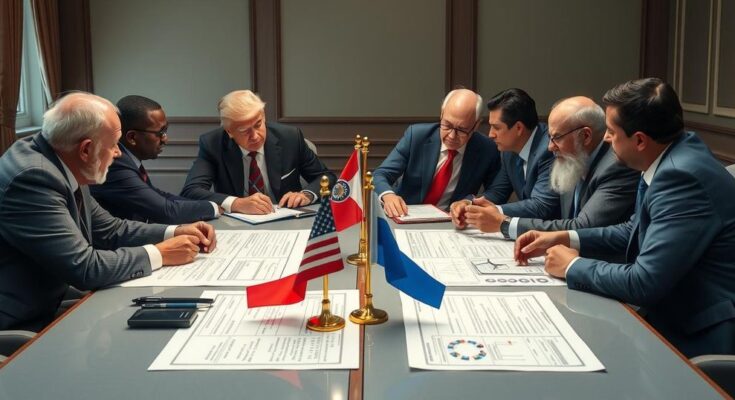Turkey, Russia, and Iran will meet this weekend in Qatar to discuss the implications of a recent rebel offensive that has seen Islamic militants capture key Syrian cities, namely Aleppo and Hama. The meeting will take place during the Doha Forum, and the discussions will focus on the urgent need for a political resolution to the escalating conflict. With various interests at stake, including Turkish concerns regarding Kurdish forces and the implications for U.S. interests, the outcome of this dialogue remains critical for ongoing stability in the region.
This weekend, Turkey, Russia, and Iran are set to convene in Qatar to address a significant shift in the Syrian civil war’s dynamic generated by recent rebel advancements. Taking place at the Doha Forum, which explores global issues, the discussions will focus on a response to the recent offensive by the Islamist group Hayat Tahrir al-Sham (HTS). This group has made considerable gains, capturing major cities like Aleppo and Hama, area long under government control.
Since the launch of the Astana process in 2017, aimed at fostering a political resolution to the conflict, Turkey, Russia, and Iran have collaborated despite differing agendas; Turkey supports certain rebel factions while the latter two back President Bashar al-Assad. Although a ceasefire was negotiated in 2020, recent developments have led President Putin to emphasize the need to quell what he termed as aggression against the Syrian state. Meanwhile, Turkish President Erdogan supports Syria’s territorial integrity and insists on the necessity of political engagement by the Assad government.
The recent HTS offensive has prompted clashes between Turkish-backed forces and U.S.-linked Kurdish groups, further complicating the already tense environment. With conflicting interests at play, both Russia and Iran face challenges of their own; Russia is preoccupied with its ongoing conflict in Ukraine, while Iran faces pressures from Israel against its proxies. In the wake of HTS’ gains, experts suggest that compromises from the Assad regime may be necessary, although opinions vary on the likelihood of these developments.
Concerned about the potential for increased Kurdish autonomy in Syria, Turkey is also focused on facilitating the return of Syrian refugees. The United States, supporting the Kurdish-led Syrian Democratic Forces (SDF), remains wary of a resurgence of ISIS amidst the conflict. The Pentagon has engaged in self-defense strikes against threats in eastern Syria, while officials stress the importance of preventing a new wave of refugee crises. As the situation unfolds, Washington continues to monitor developments closely to mitigate risks to regional stability and safeguard its interests.
The Syrian civil war has been ongoing for over a decade, involving multiple factions and foreign powers. The Astana process was initiated by Russia, Turkey, and Iran to find a political resolution to the conflict, diversifying their roles in the war. Turkey has been an advocate for the Syrian National Army, while Russia and Iran have provided military support to President Assad’s government. The recent HTS offensive marks a significant shift in power dynamics, threatening the central control of the Assad government. This scenario has escalated tensions and raised new challenges for foreign stakeholders, including the United States, which is invested in countering ISIS and managing alliances in the region.
In summary, the imminent talks among Turkey, Russia, and Iran reflect the changing landscape of the Syrian conflict, driven predominantly by the recent aggressive advances of HTS. With varying objectives, these nations must navigate complex political terrains. The ongoing challenges from the Kurdish presence and the U.S.’s involvement further complicate the scenario. The potential for compromise and political solutions is uncertain, but critical for establishing a new equilibrium in Syria and addressing regional stability concerns.
Original Source: www.voanews.com




